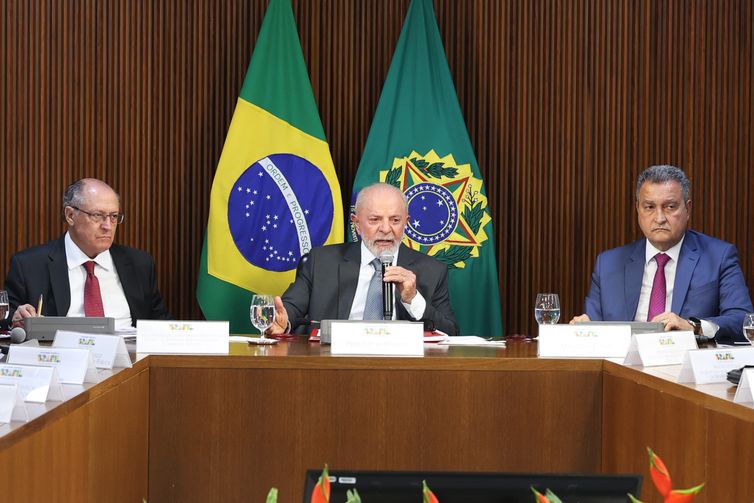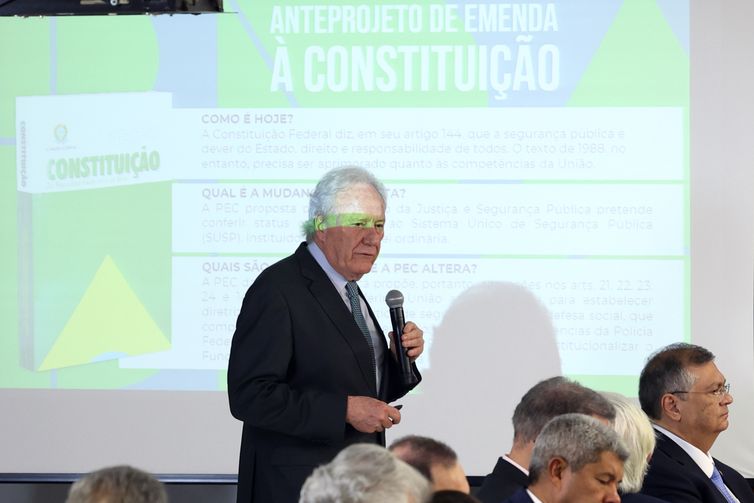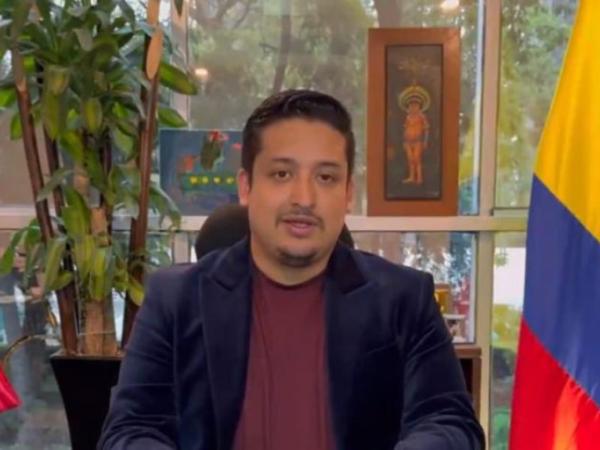President Luiz Inácio Lula da Silva was in a meeting with governors this Thursday (31) at Palácio do Planalto, in Brasília, to present the Proposed Constitutional Amendment (PEC) for Public Security.
“I wanted this meeting to be a meeting in which the governors had no concerns about saying what they thought they should say. It is a meeting in which there is no censorship, there is no impediment for everyone to say what they think, what they think is true and, above all, also to make some proposal for a solution so that we can move forward on this matter”, said Lula at the beginning of the meeting.
According to the Minister of Justice and Public Security, Ricardo Lewandowski, the text of the 1988 Federal Constitution “needs to be improved” to “give a federative character” to the fight against organized crime. The proposal is to change the wording of articles 21, 22, 23 and 24 – which deal with the Union’s competences, private or in common with the states, municipalities and Federal District – and article 144 “which establishes in detail which bodies are part of the Brazilian public security system”, described the minister.
If approved by the National Congress, the federal government must act together with states and municipalities. A national council formed by the three federative entities must establish general standards for security forces. It could, for example, define administrative standards for the penitentiary system and regulate the use of body cameras. The federal government guarantees that the PEC does not remove powers or violate the autonomy of other federative entities.
PEC tripod
The government’s proposal has the tripod of increasing the powers of the Federal Police (PF) and the Federal Highway Police (PRF), giving constitutional status to the Unified Public Security System (Susp), created by ordinary law in 2018 (Law 13,675) and also introduce the rules of the National Public Security Fund and Penitentiary Policy into the Federal Constitution, unifying the current National Public Security Fund and the Penitentiary Fund.
According to the text of the PEC presented to the governors, the PRF is now called Federal Ostensive Police, intended for patrolling federal highways, railways and waterways. Once authorized, the new police will also be able to protect federal goods, services and facilities; and “provide emergency and temporary assistance to state or district security forces, when requested by their governors.”
In the case of the Federal Police, it will now be destined to “investigate criminal offenses against the political and social order or to the detriment of goods, services and interests of the Union, including in forests, forests, preservation areas, or conservation units, or also of its autonomous entities and public companies, as well as other infractions whose practice has interstate or international repercussions and requires uniform repression, such as those committed by criminal organizations and private militias.” Lewandowski considers the changes in the PF and current PRF update what already happens “in practice”
The PEC points out that the National Fund for Public Security and Penitentiary Policy cannot be contingent and will have the objective of “guaranteeing resources to support projects, activities and actions in accordance with the national public security and social defense policy.”
Standardization
The federal government still wants to standardize security protocols such as police reports and criminal record certificates, and the generation of information and statistical data. According to Ricardo Lewandowski, the intention is to “standardize the language but each state in its system”, as was done in the Judiciary to share and feed the same database.
In the presentation to the governors, the minister guaranteed that the PEC “does not centralize the use of information technology systems; does not intervene in the command of the state police; does not diminish the current competence of states and municipalities; and does not create new public positions.”
The government defended the need to change the Constitution, arguing that “the nature of crime has changed. It is no longer just local but also interstate and transnational.”
“If in the past they were neighborhood gangs, isolated, violent criminals that existed in one city or another, in one state or another, today we are talking about a criminal organization that quickly takes on the shape of a mafia organization in Brazil, since they Not only are they in crime, but they are migrating into the real economy. They are offering training courses for military police and civil police competitions. They are participating in the financing of electoral campaigns”, added Rui Costa, chief minister of the Civil House.
Procedures
The government admits that the PEC may be modified following contributions from governors before being forwarded to the Legislative Branch.
As a rule, a constitutional amendment proposal must be evaluated separately in the two houses of the National Congress – the Chamber of Deputies and the Federal Senate, successively. In each house, it must be submitted to the Constitution and Justice committees to verify admissibility.
If accepted, the PEC must be discussed in a special committee. Approved, it goes to the Plenary. In both the Chamber and the Senate, to be approved the PEC must have at least three-fifths of the votes in two rounds of voting. At least 308 favorable votes from federal deputies and 49 favorable votes from senators. For approval in both houses, the government will need favorable votes from the opposition.


















